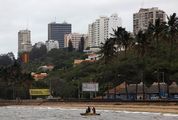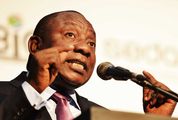Analysis of SA’s ills needs truth, not hype
by Greg Mills and Jeffrey Herbst,
2015-11-24 05:55:11.0
THE season of goodwill is also the season of analytical apocalypse. Debate about SA’s fortunes is transfixed on the country’s "descent", its leadership crisis, and how long it might "survive". There are three main strands of argument: SA, if not a failed state, is on the brink of failure; this is the result of the governing party losing its way, hastened by President Jacob Zuma; and the situation requires a radical solution, such as international intervention by the International Monetary Fund (IMF), to "turn things around".
While these views may move copy, they are at best hyperbole. While there are aspects of concern in SA, it is not a failed state. It ranks, for example, 113 of 178 countries measured in the Failed States index, in the "low warning" category, the same as Malaysia, Brazil or Cyprus. Compared to fellow Brics members Brazil, Russia and India, SA has a lot going for it — it is relatively open (unlike Brazil), is not dependent on a single commodity or authoritarian (unlike Russia) and has, for all its failings, few of India’s infrastructure and bureaucratic constraints.
On the contrary, SA has considerable resources that will allow it to go down its current path for many years. Indeed, that is part of the problem. There are great, continuous costs to this, as is evident in Eskom’s travails. And the longer the decay, the longer the repair and the more daunting the challenge SA will face.
The problem with SA’s political environment is more than just Zuma’s doing, and the solution will demand more than just his unmaking. In fact, to tie the country’s decline to one man understates the extent of the problem.
The issue is institutional.
SA has always had a statist economy with relatively low employment levels. However, the white governments were dedicated to serving a minority of the population, making SA’s racial socialism viable for decades, although apartheid eventually ran aground. The African National Congress’s (ANC’s) governance problems are becoming evident sooner because it is trying to serve the entire country with a similar brand of statism.
The challenge, therefore, is not so much to change the leadership as to alter the trajectory of an economy that still suffers from significant state intervention, which is only becoming worse. Regrettably, the history of liberation movements across Africa is that they quickly assume the inheritance, the old statist and centrist ways of doing things, until they are themselves liberated from power.
History shows that external intervention generally makes things worse. For things to change, countries have to own the solutions and the problems. At best, it would be a short-term fix to call in the IMF, or anyone else. A different overall policy approach is required for a better longer-term future.
There is also a greater danger in the hyperbole over SA’s current situation. The hyperpoliticisation and personalisation make it easier for the ANC to dismiss such criticism since the case can easily be made that the country’s achievements have been ignored and that the complaints, no matter how well-grounded, are racially motivated. Like it or not, the ANC is set to be the party with the most votes for some time to come. Therefore, critiques must be sharp and well-evidenced, but go beyond demanding political suicide.
Getting the politics right is, of course, critical. But to do so, the rhetorical critique has to be matched by a substantive alternative beyond only railing continuously against the absence of accountability and openness, and presence of corruption and nepotism. We believe the critique should be more usefully brought down a notch or two to the realm of practical ideas; to focus on steps to deal with security and infrastructure constraints in the short term, and beyond that, the longer-term issues: education and governance.
• Dr Mills heads the Brenthurst Foundation, Dr Herbst the Newseum in Washington. They are the authors of How South Africa Works — and Must Do Better.
THE season of goodwill is also the season of analytical apocalypse. Debate about SA’s fortunes is transfixed on the country’s "descent", its leadership crisis, and how long it might "survive". There are three main strands of argument: SA, if not a failed state, is on the brink of failure; this is the result of the governing party losing its way, hastened by President Jacob Zuma; and the situation requires a radical solution, such as international intervention by the International Monetary Fund (IMF), to "turn things around".
While these views may move copy, they are at best hyperbole. While there are aspects of concern in SA, it is not a failed state. It ranks, for example, 113 of 178 countries measured in the Failed States index, in the "low warning" category, the same as Malaysia, Brazil or Cyprus. Compared to fellow Brics members Brazil, Russia and India, SA has a lot going for it — it is relatively open (unlike Brazil), is not dependent on a single commodity or authoritarian (unlike Russia) and has, for all its failings, few of India’s infrastructure and bureaucratic constraints.
On the contrary, SA has considerable resources that will allow it to go down its current path for many years. Indeed, that is part of the problem. There are great, continuous costs to this, as is evident in Eskom’s travails. And the longer the decay, the longer the repair and the more daunting the challenge SA will face.
The problem with SA’s political environment is more than just Zuma’s doing, and the solution will demand more than just his unmaking. In fact, to tie the country’s decline to one man understates the extent of the problem.
The issue is institutional.
SA has always had a statist economy with relatively low employment levels. However, the white governments were dedicated to serving a minority of the population, making SA’s racial socialism viable for decades, although apartheid eventually ran aground. The African National Congress’s (ANC’s) governance problems are becoming evident sooner because it is trying to serve the entire country with a similar brand of statism.
The challenge, therefore, is not so much to change the leadership as to alter the trajectory of an economy that still suffers from significant state intervention, which is only becoming worse. Regrettably, the history of liberation movements across Africa is that they quickly assume the inheritance, the old statist and centrist ways of doing things, until they are themselves liberated from power.
History shows that external intervention generally makes things worse. For things to change, countries have to own the solutions and the problems. At best, it would be a short-term fix to call in the IMF, or anyone else. A different overall policy approach is required for a better longer-term future.
There is also a greater danger in the hyperbole over SA’s current situation. The hyperpoliticisation and personalisation make it easier for the ANC to dismiss such criticism since the case can easily be made that the country’s achievements have been ignored and that the complaints, no matter how well-grounded, are racially motivated. Like it or not, the ANC is set to be the party with the most votes for some time to come. Therefore, critiques must be sharp and well-evidenced, but go beyond demanding political suicide.
Getting the politics right is, of course, critical. But to do so, the rhetorical critique has to be matched by a substantive alternative beyond only railing continuously against the absence of accountability and openness, and presence of corruption and nepotism. We believe the critique should be more usefully brought down a notch or two to the realm of practical ideas; to focus on steps to deal with security and infrastructure constraints in the short term, and beyond that, the longer-term issues: education and governance.
• Dr Mills heads the Brenthurst Foundation, Dr Herbst the Newseum in Washington. They are the authors of How South Africa Works — and Must Do Better.






















Change: 1.37%
Change: 1.32%
Change: 2.91%
Change: 0.45%
Change: 3.09%
Data supplied by Profile Data
Change: 1.63%
Change: 0.83%
Change: 1.37%
Change: 0.00%
Change: 0.69%
Data supplied by Profile Data
Change: -2.04%
Change: -1.81%
Change: -1.61%
Change: -1.86%
Change: -1.48%
Data supplied by Profile Data
Change: -1.21%
Change: 0.31%
Change: -0.72%
Change: -1.39%
Change: 2.92%
Data supplied by Profile Data